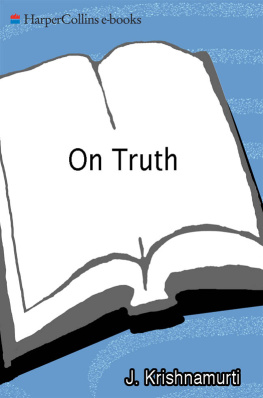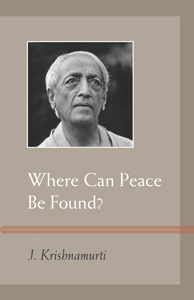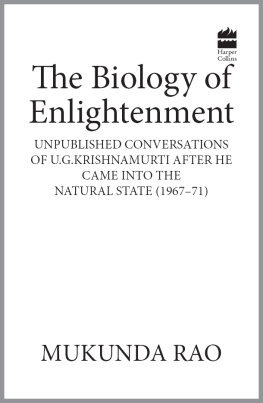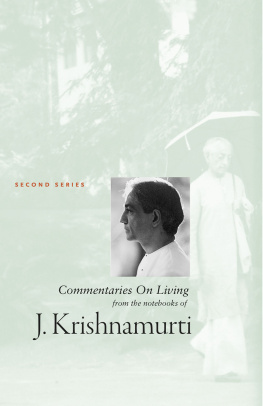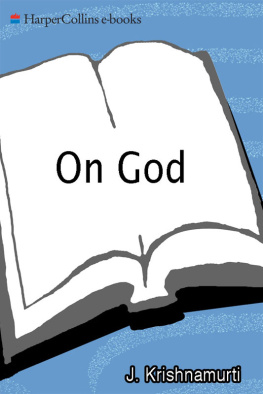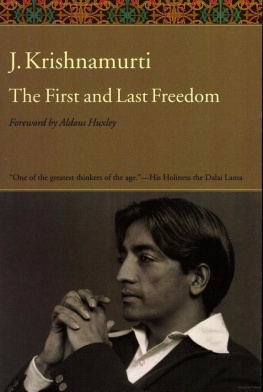Krishnamurti - On Truth
Here you can read online Krishnamurti - On Truth full text of the book (entire story) in english for free. Download pdf and epub, get meaning, cover and reviews about this ebook. City: San Francisco (Calif, year: 1995, publisher: HarperCollins;Harper San Francisco, genre: Religion. Description of the work, (preface) as well as reviews are available. Best literature library LitArk.com created for fans of good reading and offers a wide selection of genres:
Romance novel
Science fiction
Adventure
Detective
Science
History
Home and family
Prose
Art
Politics
Computer
Non-fiction
Religion
Business
Children
Humor
Choose a favorite category and find really read worthwhile books. Enjoy immersion in the world of imagination, feel the emotions of the characters or learn something new for yourself, make an fascinating discovery.
- Book:On Truth
- Author:
- Publisher:HarperCollins;Harper San Francisco
- Genre:
- Year:1995
- City:San Francisco (Calif
- Rating:5 / 5
- Favourites:Add to favourites
- Your mark:
- 100
- 1
- 2
- 3
- 4
- 5
On Truth: summary, description and annotation
We offer to read an annotation, description, summary or preface (depends on what the author of the book "On Truth" wrote himself). If you haven't found the necessary information about the book — write in the comments, we will try to find it.
On Truth questions the very nature of reality and asks whether truth can be found by following any belief or teacher. Krishnamurti taught that truth comes uninvited, with glory, when one puts all in order, and in that there is great sacredness.
On Truth — read online for free the complete book (whole text) full work
Below is the text of the book, divided by pages. System saving the place of the last page read, allows you to conveniently read the book "On Truth" online for free, without having to search again every time where you left off. Put a bookmark, and you can go to the page where you finished reading at any time.
Font size:
Interval:
Bookmark:

Religion means exploring with doubt, questioning sceptically, investigating what is truth. That is religion.
Ojai, 2 May 1981
J IDDU K RISHNAMURTI was born in India in 1895 and, at the age of thirteen, was taken up by the Theosophical Society, which considered him to be the vehicle for the world teacher whose advent it had been proclaiming. Krishnamurti was soon to emerge as a powerful, uncompromising, and unclassifiable teacher, whose talks and writings were not linked to any specific religion and were neither of the East nor the West but for the whole world. Firmly repudiating the messianic image, in 1929 he dramatically dissolved the large and monied organization that had been built around him and declared truth to be a pathless land, which could not be approached by any formalized religion, philosophy, or sect.
For the rest of his life Krishnamurti insistently rejected the guru status that others tried to foist upon him. He continued to attract large audiences throughout the world but claimed no authority, wanted no disciples, and spoke always as one individual to another. At the core of his teaching was the realization that fundamental changes in society can be brought about only by a transformation of individual consciousness. The need for self-knowledge and understanding of the restrictive, separative influences of religious and nationalistic conditionings was constantly stressed. Krishnamurti pointed always to the urgent need for openness, for that vast space in the brain in which there is unimaginable energy. This seems to have been the wellspring of his own creativity and the key to his catalytic impact on such a wide variety of people.
Krishnamurti continued to speak all over the world until he died in 1986 at the age of ninety. His talks and dialogues, journals and letters have been preserved in over sixty books and hundreds of recordings. From that vast body of teachings this series of theme books has been compiled. Each book focuses on an issue that has particular relevance to and urgency in our daily lives.
Questioner: Memory, you say, is incomplete experience. I have a memory and a vivid impression of your previous talks. In what sense is this an incomplete experience? Please explain this in detail.
Krishnamurti: What do we mean by memory? You go to school, and are full of facts, technical knowledge. If you are an engineer, you use the memory of technical knowledge to build a bridge. That is factual memory. There is also psychological memory. You have said something to me, pleasant or unpleasant, and I retain it; and when I next meet you, I meet you with that memory, the memory of what you have said or have not said.
So there are two facets to memory, the psychological and the factual. They are always interrelated, and therefore not clear-cut. We know that factual memory is essential as a means of livelihood. But is psychological memory essential? And what is the factor that retains the psychological memory? What makes one remember insult or praise? Why does one retain some memories and reject others? Obviously, one retains memories that are pleasant, and avoids those that are unpleasant. If you observe, you will see that painful memories are put aside quicker than pleasurable ones. And mind is memory, at whatever level, by whatever name you call it; mind is the product of the past, it is founded on the past, which is memory, a conditioned state.
Now, with that memory we meet life, we meet a new challenge. The challenge is always new, and our response is always old, because it is the outcome of the past. So experiencing without memory is one state, and experiencing with memory is another. That is, there is a challenge, which is always new. I meet it with the response, with the condition of the old. So what happens? I absorb the new, I do not understand it; and the experiencing of the new is conditioned by the past. Therefore, there is a partial understanding of the new, there is never complete understanding. It is only when there is complete understanding of anything that it does not leave the scar of memory.
When there is a challenge, which is ever new, you meet it with the response of the old. The old response conditions the new, and therefore twists it, gives it a bias. There is therefore no complete understanding of the new; hence the new is absorbed into the old, and thereby strengthens the old. This may seem abstract, but it is not difficult if you go into it a little closely and carefully. The situation in the world at the present time demands a new approach, a new way of tackling the world problem, which is ever new. We are incapable of approaching it because we approach it with our conditioned minds, with national, local, family, and religious prejudices. That is, our previous experiences are acting as a barrier to the understanding of the new challenge, so we go on cultivating and strengthening memory and, therefore, never understand the new; we never meet the challenge completely. It is only when one is able to meet the challenge anew, afresh, without the past, that it yields its fruits, its riches.
The questioner says, I have a memory and a vivid impression of your previous talks. In what sense is this an incomplete experience? Obviously, it is an incomplete experience if it is merely an impression, a memory. If you understand what has been said, see the truth of it, that truth is not a memory. Truth is not a memory, because truth is ever new, constantly transforming itself. You have a memory of the previous talk. Why? Because you are using the previous talk as a guide, you have not fully understood it. You want to go into it, and unconsciously or consciously it is being maintained. But if you understand something completely, that is, see the truth of something wholly, you will find there is no memory whatsoever.
Our education is the cultivation of memory, the strengthening of memory. Your religious practices and rituals, your reading and knowledge, are all the strengthening of memory. What do we mean by that? Why do we hold to memory? I do not know if you have noticed that, as you grow older, you look to the past, to its joys, its pains, its pleasures; and if one is young, one looks to the future. Why are we doing this? Why has memory become so important? For the simple and obvious reason that we do not know how to live wholly, completely in the present. We are using the present as a means to the future, and therefore the present has no significance. We cannot live in the present because we are using the present as a passage to the future. Because I am going to become something, there is never a complete understanding of myself, and understanding myselfwhat I am exactly nowdoes not require the cultivation of memory. On the contrary, memory is a hindrance to the understanding of what is.
I do not know if you have noticed that a new thought, a new feeling, comes only when the mind is not caught in the net of memory. There is an interval between two thoughts, between two memories, and when that interval can be maintained, then out of that interval comes a new state of being that is no longer memory. We have memories, and we cultivate memory, as a means of continuance. That is, the me and the mine become very important as long as the cultivation of memory exists; and as most of us are made up of me and mine, memory plays a very important part in our lives. If you had no memory, your property, your family, your ideas, would not be important as such; so to give strength to me and mine, you cultivate memory. But if you observe, you will see that there is an interval between two thoughts, between two emotions. In that interval, which is not the product of memory, there is an extraordinary freedom from the me and the mine, and that interval is timeless.
Next pageFont size:
Interval:
Bookmark:
Similar books «On Truth»
Look at similar books to On Truth. We have selected literature similar in name and meaning in the hope of providing readers with more options to find new, interesting, not yet read works.
Discussion, reviews of the book On Truth and just readers' own opinions. Leave your comments, write what you think about the work, its meaning or the main characters. Specify what exactly you liked and what you didn't like, and why you think so.

